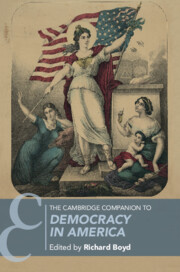Book contents
- The Cambridge Companion to Democracy in America
- Series page
- The Cambridge Companion to Democracy in America
- Copyright page
- Contents
- Contributors
- Acknowledgments
- Chronology
- Abbreviations of Tocqueville’s Major Works
- Introduction
- Part I Sources and Contexts
- Part II Receptions and Applications
- Part III Genres and Themes
- 9 “Ideas for the Intellect and Emotions for the Heart”
- 10 Tocquevillean Association and the Market
- 11 Tocqueville on the Federal Constitution
- 12 Religion in Democracy in America
- 13 Tocqueville’s Puritans
- Part IV Democracy’s Enduring Challenges
- References
- Index
- Series page
10 - Tocquevillean Association and the Market
from Part III - Genres and Themes
Published online by Cambridge University Press: 23 March 2022
- The Cambridge Companion to Democracy in America
- Series page
- The Cambridge Companion to Democracy in America
- Copyright page
- Contents
- Contributors
- Acknowledgments
- Chronology
- Abbreviations of Tocqueville’s Major Works
- Introduction
- Part I Sources and Contexts
- Part II Receptions and Applications
- Part III Genres and Themes
- 9 “Ideas for the Intellect and Emotions for the Heart”
- 10 Tocquevillean Association and the Market
- 11 Tocqueville on the Federal Constitution
- 12 Religion in Democracy in America
- 13 Tocqueville’s Puritans
- Part IV Democracy’s Enduring Challenges
- References
- Index
- Series page
Summary
Many thinkers have alleged that free markets are inimical to a sense of community. According to critics such as Robert Putnam, commercial societies tend to dissociate people from one another and to undermine the basis of civil society. Alexis de Tocqueville’s Democracy in America seems to present a challenge to this view insofar as he regards the Americans as both exceptionally commercial and uniquely associational. If markets and associations are in tension with one another, how can they coexist in the United States? As Rachael K. Behr and Virgil Henry Storr argue in this chapter, a closer attention to Democracy in America suggests several ways in which commercial society and the spirit of association are mutually supportive. Markets foster a complex division of labor that requires mutual cooperation. Markets encourage a sense of enlightened self-interest that teaches citizens how they might engage with one another in mutually beneficial ways. Further, markets facilitate innovations in communication that make it easier for citizens to coordinate and freely associate for political change. Rather than giving rise to Tocqueville’s dreaded pathology of “individualism,” as critics have alleged, markets are instead conducive to active civic engagement and the free association of democratic citizens.
Keywords
- Type
- Chapter
- Information
- The Cambridge Companion to Democracy in America , pp. 278 - 305Publisher: Cambridge University PressPrint publication year: 2022
- 1
- Cited by



